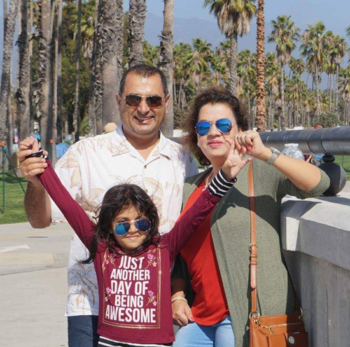
By Michael Ashcraft —
From a very young age, Nepal-born Surya Bhandari had a fervent desire to please the Hindu god Shiva. Because Shiva smoked marijuana, Surya sought to please him by smoking weed himself — starting at age 8.
Then in the sixth grade he learned about the dangers of tuberculosis and cancer from smoking and began to question the wisdom of the god. Also, kids at school started pointing at him as a “bad kid” for his cannabis consumption.
“In my little mind, I started thinking, ‘Why do they call me bad?’” Surya remembers. “‘This great god Shiva smokes marijuana. Why would they call me bad? Is it really bad? If I am bad, then this god Shiva is bad. If he is bad, is he really a god?’”
He belonged to the priestly Brahman class, but he turned his back on Hinduism, called himself an “atheist,” started using other drugs and alcohol.
“This Shiva destroyed my life,” he reasoned. “I’m not able to quit smoking marijuana. Someday I’m going to get TB or cancer and I’m going to die, and this god is responsible.
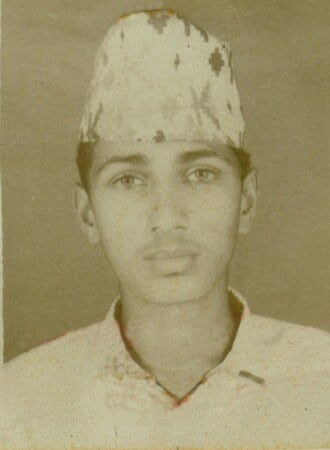
“I became so angry.”
One day he had a dream of being chased by a tall figure clad in a white gown. He thought it was a ghost. It scared him so badly that he didn’t want to go to his usual taekwondo that morning and instead decided to distract himself by reading one of his older brother’s books.
His older brother had either left home or been kicked out — he wasn’t really sure — because he had secretly become a Christian and was attending underground meetings somewhere downtown.
As Surya thumbed through the volumes on the bookcase, he happened to pull out a slim volume, opened it and saw — to his utter surprise — a picture of the same white-clad figure. Suddenly his fear abated, and he continued to read eagerly. “It was God, not a ghost,” he concluded.
From that moment on, he wanted to become a Christian. But attending a church was no easy matter in those days in Nepal. Carrying a Bible was a crime worse than drug trafficking (Broad religious freedoms were not granted until Nepal ratified the International Covenant on Civil and Political Rights in 1991).
But Surya was determined. He begged an old friend of his brother to tell him where he could find the underg4ound church that his brother attended. The young man was backslidden at the time and didn’t want to say anything. But after days of begging, Surya got him to relent and give him some rough directions.
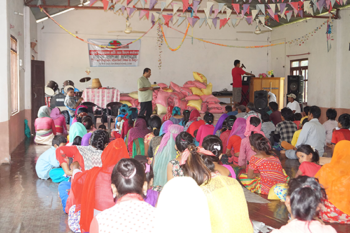
The first chance he got he went eight miles away from his village to Pokhara. He liked the songs and listened intently without understanding much of the sermon. To his surprise after the service, nobody approached him or talked to him to explain things, and he was too shy to ask.
Maybe people were afraid of the strict anti-proselytizing laws. They could get into a lot of trouble if they were perceived as trying to convert someone. Also, some may have been cautious, because a newcomer might be a spy from the police.
But Surya didn’t understand all of this at the time. It seemed to him that God’s people were indifferent. The next time Surya went to church it was the same. Nobody talked to him. So he quit going.
Then he did something that brought great shame on his family. He flunked out of school. His parents scolded him constantly and his brothers beat him.
So he took to the streets. He would leave before anybody woke up. He would come home, entering through the window, after everybody was in bed. His grandmother always saved him some food.
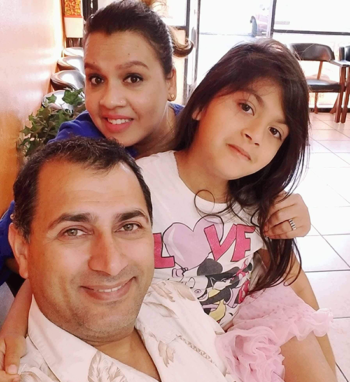 He tried but found that he couldn’t quit drugs. Everybody in town called him a bad kid. Even the principal of the school saw fit to take him aside and rebuke him for bringing shame on his family.
He tried but found that he couldn’t quit drugs. Everybody in town called him a bad kid. Even the principal of the school saw fit to take him aside and rebuke him for bringing shame on his family.
All this was too much for Surya and he began to contemplate suicide.
“I loved my father so much. I did not want to bring shame on my father,” he says, reasoning to himself at the time: “If I can’t bring a good name for him, I have no right to live.”
He decided to throw himself off a cliff and into the sacred Gandaki River near his town.
But every time he climbed to the remote heights to carry out his plan, there was somebody there to interfere. One day, it was the kid sister of a friend. He had told her to notify his friend of his death, and she began to encourage him to overcome his adversities and not give up. Today Surya believes she was inspired the Holy Spirit because she spoke eloquently, with maturity well beyond her years.
“God was even using her to save my life,” he says.
Sometimes he would show up at his home midday when nobody but Grandma was there. One time, he came and his older Christian brother was there talking to his mother. Expecting a beating, he started to run away, but his older brother called him. While his mother berated him, Surya hung his head, expecting the inevitable.

But instead of hitting him, his other brother patted him on the back. Then he spoke: “I heard about you and know everything about you. But Jesus loves you and wants to change your life.”
Instead of a beating, he got words of kindness. Tears came to his eyes. He remembered the dream of the white-clad figure and the reading of the book from when he was younger.
“I was angry with Hindu gods, but the Christian God was interested in me,” he says.
His brother took him to church. There a youth shared the Four Spiritual Laws with him, and Surya accepted Jesus into his heart. He was born again!
His life began to be transformed. But instead of getting better, things initially got worse.
His dad kicked him out. Flunking school and using drugs was bad, his dad said, but converting to Christianity was worse.
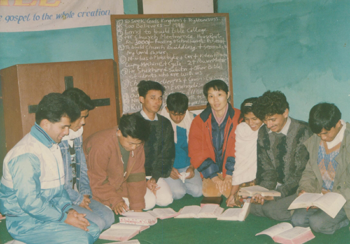
At age 16, Surya fled to Kathmandu, meeting up with his older brother and joining the church, which consisted of eight people. He slept on the church floor and helped the pastor with chores. There were other runaways. They had early morning prayer and classes.
He grew into manhood in the service of the Lord. He decided service would be his life.
“Lord, I have failed in high school. I’ve been told I’m good for nothing,” he vowed. “I can’t speak. I’m too shy. If you can use me, please lord, use me. I want to serve you.”
At age 18, the opportunity arose from him to finish high school and attend Boon Bible School in India. With a scholarship, his studies were free, but he and his buddy had to sell books in the street to supply money for food.
While he was in Bible school, his father, who could never get grandmother well through the usual shamans, found that Jesus could evict demons once and for all. He came to Kathmandu, found Surya’s older brother and asked how to be saved.
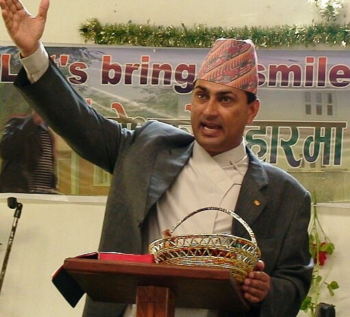 Surya and all the Bible school cried tears of joy when they heard the news.
Surya and all the Bible school cried tears of joy when they heard the news.
When he went back to Kathmandu, he was named an associate pastor and oversaw, with his friend, 50 cell groups.
But he kept thinking about his village. There were a smattering of Christians but no church. He realized it was easier for him, as only an associate pastor, to relinquish his duties in Kathmandu. He felt called to start a church in 1996 and his father gave him some land to build it.
Some of his childhood friends were the first converts. He taught them everything he had learned in Bible school. Soon, they planted 10 self-supporting churches around the Pokhara Valley.
After about eight years, communists came into the valley and started creating havoc. They kidnapped church members and demanded money. Surya realized his life was in danger and applied for a refugee visa to the United States. He landed in the San Fernando Valley, California, where he first worked with homeless for the local Rescue Mission. Later he drove for Uber and his wife worked at a beauty salon.
In 2015 when a huge earthquake devastated Nepal, friends funded him to fly there and distribute food to 500 families in the Pokhara Valley.
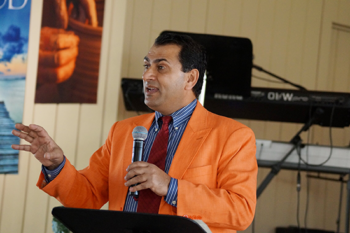 Surya, now 48, is a volunteer associate pastor at the Sylmar Light and Life Methodist Church. Whatever extra money he raises through Uber goes to the construction of the permanent roof for the church. He last wired $5,000.
Surya, now 48, is a volunteer associate pastor at the Sylmar Light and Life Methodist Church. Whatever extra money he raises through Uber goes to the construction of the permanent roof for the church. He last wired $5,000.
Of his family in Nepal, one brother remains unconverted and has erected an iron gate across a public road to block people from coming to church. This is ironic, Surya says, because his brother is a politician in the democratic party that fights against abuses perpetrated against minorities, including religious minorities.
Over time, the shame Surya “brought on the family” has turned to glory.
If you want to know more about a personal relationship with God, go here
https://www.youtube.com/watch?v=cwYqXyJryPw




This is an awesome testimony, very inspiring, very encouraging. Thank you for sharing.
Comments are closed.